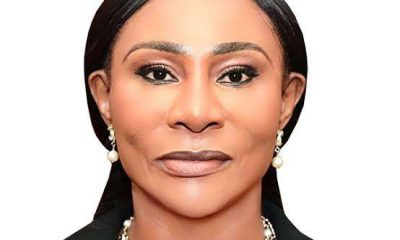Business
High interest rates: Bank customers seek Esusu, cooperatives for soft loans

…as DMBs fees soar to almost 40 percent
Many Nigerian families and businesses in need of funds have turned to savings and cooperative societies and other informal finance practices like thrift collection, popularly known as Esusu, in their bid to avoid high interest rates charged by Deposit Money Banks (DMBs), Business Hallmark can report.
The shift to semi-formal and informal bodies for funds, findings revealed, is being fuelled by the high interest rates of between 15% to 35% interests charged by DMBs and lending houses on consumer loans, such as auto lending, personal loans, health, mortgage, salary advance, education loan, business loan and travel loan, among many others, which many Nigerians can not afford.
As a result of the boom in patronage, the finances of savings and cooperative societies and Esusu practitioners have recorded a major boost, making many of them to embark on a charm offensive to woo over more customers from banks.
The Monetary Policy Committee (MPC) of the Central Bank of Nigeria (CBN), it would be recalled, had embarked on a sustained Monetary Policy Rate (MPR) hike since February 2024 in its efforts to curb excess money in circulation and stem rising inflation.
The MPR is the benchmark rate for borrowing by commercial banks in the country. A breakdown of interest rate hikes by BH indicates that the CBN increased the benchmark interest rate by 400 basis points to a record 22.75% in February 2024.
It followed suit in March when it further increased the MPR by 200 basis points from 22.75 percent to 24.75 percent. In May 2024, the CBN increased the benchmark interest rate by 150 basis points from 24.75 percent to 26.25 percent.
In the month of July, the committee also raised the interest rate by 50 basis points from 26.25 percent to 26.75 percent.
At its last meeting in September, the CBN’s MPC further jacked up interest rates by another 50 basis points from 26.75 percent to 27.25 percent.
The MPC is yet to sit in October to decide the rate of interest to be charged by banks for the coming month.
Under Yemi Cardoso’s leadership of the CBN in just one year, interest rates have been raised by 850 basis points.
Expectedly, interests charged by DMBs and lending houses, especially the ones by quick loan apps on consumer loans like auto lending, personal loans, health, mortgage, salary advance, education loans, business loans, and travel loans, among many others, have gone up considerably, with some charging as much as 35% to 40% interest after all fees like application/processing, maintenance, insurance, and management fees are added.
As a result of the high cost of obtaining bank loans, compared to the fees charged by alternative financial institutions like savings and cooperative societies and Esusu collectors, these alternative providers have become Nigerian’s go-to institutions for quick, cheap, and convenient funds.
A poll conducted by BH indicates that six out of 10 low-income and middle-class Nigerians have either approached cooperative societies or participated in Esusu to raise needed funds owing to their low waiting/approval period, low charges, dividend paid, and convenience.
For instance, findings show that over 70 percent of civil servants across the country belong to one cooperative society or the other, while over 50 percent of the workforce in established companies in the private sector are members of their staff-owned cooperatives.
According to BH findings, apart from several benefits like low interest rates, members of these cooperative societies share profits realized from loans given out to borrowers in the form of dividends and yearly gifts.
Checks by our correspondent revealed that cooperatives across the country charge relatively low rates of between 8% to 14.4% on loans secured from them, compared to most DMBs, which charge relatively higher.
A member of the Oshodi-Isolo Excel Cooperative Multipurpose Society in Oshodi, Lagos, who did not want her identity disclosed, confided in BH that she started doing business with the society when she learned about their low charges on loans.
“I have been a member of the Oshodi-Isolo Excel Cooperative Multipurpose Society for more than twelve years without going to them for loans.
“I used to get soft loans from my banks until recently when we needed funds to pay my daughter’s tuition in a private university.
“When they gave me their rate, I was a bit concerned because it was on the high side. For a loan of N1m only, I will end up paying interest of N290,000, which translates to 29 percent.
“Thankfully, I mentioned my predicament in the presence of a colleague at work, who suggested I should join a cooperative society.
“When I replied that I am already a member of three societies, she advised that I should rather approach them for help instead of wasting my time on banks.
“At the end of the day, I was able to raise the extra N1,000,000 I needed to complete the funds already raised for the purpose from two of the cooperative societies with a combined annual interest of N125,000.
“I joined the societies primarily to save money for my retirement, totally oblivious of other benefits. Imagine being a member of a society for over twelve years and never benefiting from it apart from the yearly dividends of about N32,000 to N40,000 and gifts like electric irons, cooking pots, towels and camp gas.
“The best part of the story is that I can get double of my savings as loans. I could have gotten over N6 million if I had asked for it as my savings is in excess of N3 million.
“I was even told that I can get a top-up after six months or access the remainder of the outstanding loan offer anytime I am ready”, the source informed our correspondent.
Another beneficiary of the mouth-watering schemes of a savings and cooperative society based in Ogun State, Bola Ogunmodede, disclosed that he recently got a loan of N5.7 million from the society to complete his house project in the Akute area of Lagos.
“The irony of it is that I bought the land from the same cooperative society more than twenty years ago in 2004 as a member. But I had struggled to raise it to the roofing level.
“Late last year, I approached them for a loan, which they approved and released in February 2024. After four months of serious work, I moved into the house in June. I am now my own landlord, thanks to my cooperative society.
“And I don’t need to have sleepless nights on the loan ballooning out of hand or how to repay it as the interest is only 8.5% and convenient as my monthly take home is over N400,000. I only pay the sum of N48,457.32 monthly which is removed directly from my salary”, Ogunmodede stated.
Apart from cooperative societies, Nigerians are also engaged in saving money for future use through thrift contributions, or Ajo or Esusu as it is popularly called in Nigeria.
The arrangement works with several people coming together to contribute money into a common purse. Money raised each month is given to a member, who continues to contribute what he or she has collected until the scheme is wrapped up, usually at the end of every year.
Contributors normally pick the month they want the money, which is tied to specific plans. In the event that an unexpected and unplanned event occurs, affected members can arrange with others to swap dates.
These quasi-arrangements, BH learned, have helped many Nigerians in solving their financial needs.
According to a civil servant based in Ilesa, Osun State, Inumidun Atayero, she is a member of at least four thrift bodies in her ministry, where she makes contributions based on future needs.
“I contribute to four different groups from January to October every year. November and December are normally excluded to free members’ finances for end-of-the-year expenses.
“I do one of N50,000 monthly, totaling N500,000, which I collect every August to pay my children’s school fees. Also, there is another contribution of N50,000 every month which I normally collect every February to buy food items in bulk.
“In the same vein, I also do one of N30,000, which I collect in April to pay house rent, and another N15,000, which is for general expenses.
“In total, I contribute N145,000 from my monthly salary of N238,000 as ajo, leaving behind N93,000, which we spend on family upkeep and other expenses like transportation.
“This arrangement has helped me to organise my life as I rarely go to banks or people for help. I don’t also give more than what I can afford as I am only able to render help or contribute to causes (family or church) from what is left of my salary, which I have largely taken upfront and must continue to pay back to those, who contributed to me”, Atayero noted.
Other contributors who spoke on their preference for the savings and finance option claimed they embraced it because it saves them from banks’ high and avoidable interest rates.
Meanwhile, BH gathered at the weekend that savings and credit cooperative societies have intensified marketing strategies to woo more borrowers to their sides
According to findings, the charm offensive is, particularly, targeted at distressed loan borrowers, who are being offered the opportunity of buying out their bank loans.
The cooperatives societies do the wooing mostly through sending messages directly to Nigerians on their mobile numbers, as well as through their field agents, who visit offices, markets, garages and shops canvassing for customers.
In one of the messages sent by a cooperative society to a member and prospective customers seen by our correspondent, the society informed them of a window to roll over their bank loans.
“Do you have a bank loan or more than one SACCO (Savings and Credit Cooperative Societies) loan? Consolidate your loans today at only one percent per month (12% annually)”, read a message by Life Saver Cooperative Multipurpose Society based in Abule-Egba, Lagos.
On how the plan works, a marketing agent in the firm, who asked to be identified only by his first name of Johnson, said successful applicants usually get loans that are higher than their bank loans, which allows them to deploy parts of the instruments to clearing their problematic bank facilities.
“After offsetting the facility, our customers get new repayment terms, which are substantially lower than the interest rates charged by banks and lending houses”, Johnson explained.
A director in the Lagos State Ministry of Commerce, Industry and Cooperatives, who demanded anonymity, said cooperative societies’ advantage over banks has to do with their relatively lower cost of funds as most of their funding is generated from members’ savings.
“Unlike commercial banks, savings and cooperative societies have not been tinkering with their interest rates on loans. This gives them a massive edge over banks and quick loan apps.
“In fact, many of them have retained their rates for years because funds loaned out are majorly contributions by members.
“In comparison, commercial banks incur higher costs of funds given their reliance on customer deposits to generate new loans to borrowers.
“Big savers with fixed deposit accounts, whose banks use their funds to trade usually demand a premium to keep their monies with them.
“However, cooperatives funds belongs to them, or let me say members. So they don’t have to pay interest on it. Members get their returns through dividends”, the official stated.






